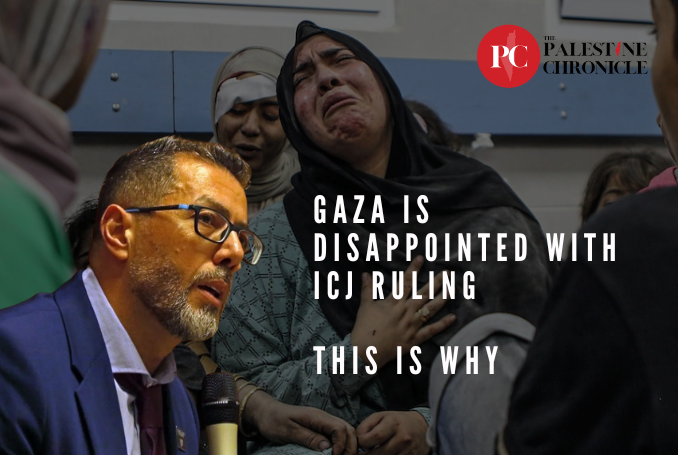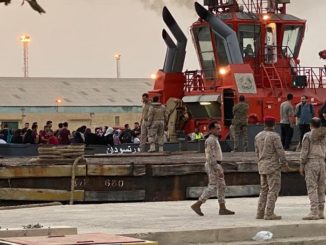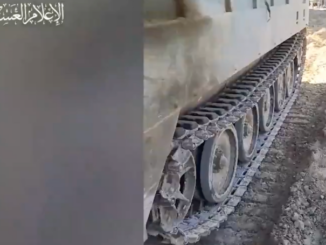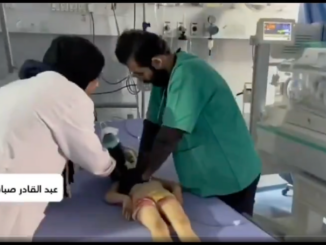
By Ramzy Baroud 
The following comments were presented by Dr. Ramzy Baroud, editor-in-chief of The Palestine Chronicle, at a private conference on the Israeli genocide in Gaza, held in London on January 27. The London Conference was attended by leading legal scholars and politicians from around the world, especially the Global South.
I had the chance to think more about the ruling by the International Court of Justice regarding the ongoing genocide in Gaza. And, while I still believe that the decision is historic, I fully understand and share the disappointment of those who are not celebrating the outcome of the hearing.
I think some of us have approached this case with different expectations than others.
Personally, like millions of Palestinians in Gaza, I was hoping that there would be some kind of a direct reference to a ceasefire that cannot be misinterpreted by the United States and Israel.
Unfortunately, that did not happen. Now, the Israelis and their American partners are saying that since the Court did not deny us the right to self-defense and did not call for an immediate ceasefire, from an international law perspective, we are not under the obligation to stop the war.
Even John Kirby, the Coordinator for Strategic Communications at the National Security Council in the White House, has found in the ruling an opportunity to claim that, in some parts, the ICJ decision is consistent with the US position: that Israel should conduct itself carefully in Gaza to minimize civilian casualties, should allow for greater access to humanitarian aid, and that sort of thing.
True, the US has been saying this as of late, but its declared political position did not prevent it from financing and fully backing the Israeli genocide.
Even the Israeli judge at the ICJ voted in favor of two of the rulings that demanded the facilitation of humanitarian aid and ending the genocidal rhetoric within Israel itself.
The truth is Palestinians have no faith in the international and legal system, and I do not think that the ICJ ruling has fundamentally altered this position.
What the ruling has achieved is, per the words of a dear friend of mine, ushered in a new historical chapter in which Israel is no longer immune to legal accountability. This explains Netanyahu’s angry stance yesterday when he called the ICJ’s ruling shameful for generations to come.
But that’s not what Gaza wanted. Gaza wanted an immediate halt to the genocide, which has, sadly, not been achieved.
Now, the discussion will go back to the UN Security Council, where the US and Israel, and possibly some of their lackeys, e.i. The UK could argue that a draft resolution for an immediate ceasefire has no legal justification since the ICJ did not call for one directly. And that’s the real shame and disappointment for the ICJ ruling, which created this grey area that will be used, abused and manipulated by Israel to continue with this genocide.
I am sorry for my people, family and friends in Gaza who were hoping to hear the word ‘ceasefire’, which could have started a real discussion about ending the war.
It goes without saying that, so far, nothing has been effective in influencing the events from the ground, aside from the Palestinian Resistance itself and the resilience, patience, and faith of the Palestinian people, within the Gaza Strip.
So where do we go from here?
I think the Palestinian people know exactly what they should do. They are not going to be sitting and waiting for the next UNSC debate, or holding their breath that maybe, perhaps, years from now, some decision might be declared by the ICJ that could achieve a measure of justice – and that that decision would be respected and not blocked by Israel and its Western allies.
That, however, should not discourage us from moving forward with our solidarity with the Palestinians. To the contrary, now that we have some legal basis that suggests that Israel is maybe carrying out a genocide in Gaza, we need to ensure that our individual governments, parliaments, city councils, churches, mosques, synagogues, civil society organizations and all the rest are mobilized to take a stance against Israel, each in its own capacity.
We should no longer submit to the direct accusation that boycotting Israel is an act of antisemitism. To the contrary, boycotting Israel now has some serious and legitimate legal basis in international law.
Any country that allows for exports or imports to and from Israel should be prevented from doing so by its own civil societies, again, who are now armed with a legal precedent.
The political context that led to the ICJ ruling proves what we have been saying for many years, that the most genuine and practical solidarity with the Palestinian people will always come from the Global South.
Practically, this means that while we must continue our advocacy and pressure on Western governments, we should invest in rooted and long-term alliances with Global South governments, civil societies, and any political, legal, academic, or social structure that would allow us to obtain and offer solidarity to our comrades in the Global South. This is not just a long-term strategy but one that can immediately bear fruits, because strong bases for solidarity already exist.
It goes without saying that any condemnation of the armed struggle of the Palestinian people is, to say the least, unhelpful if not right insidious, as it is the equivalent of denying the Palestinians their last line of defense.
In the Global North, we must activate all of our options, starting with boycott at all levels, of all governments, companies and individuals that directly or indirectly contribute to the Israeli genocide in Gaza, and the Israeli occupation and apartheid in general.
While it is important that we remain committed to holding Israel accountable in terms of its violations of international law, we must not allow ourselves to be satisfied with and distracted by the ICJ ruling and the debate around it.
We must go back to the mission at hand. Ceasefire now and complete accountability for Israeli war crimes and criminals at the ICJ, the ICC, and every other international and domestic legal institution.

– Ramzy Baroud is a journalist and the Editor of The Palestine Chronicle. He is the author of six books. His latest book, co-edited with Ilan Pappé, is “Our Vision for Liberation: Engaged Palestinian Leaders and Intellectuals Speak out”. Dr. Baroud is a Non-resident Senior Research Fellow at the Center for Islam and Global Affairs (CIGA). His website is www.ramzybaroud.net








Go back to the mission at hand. Ceasefire now and complete accountability for Israeli Genocide and war crimes.